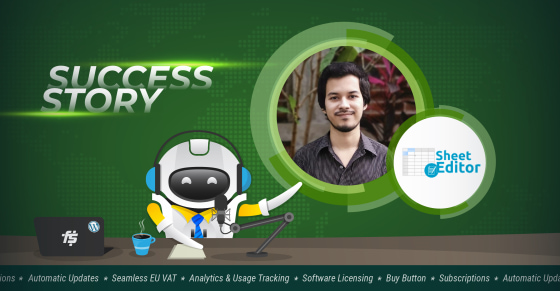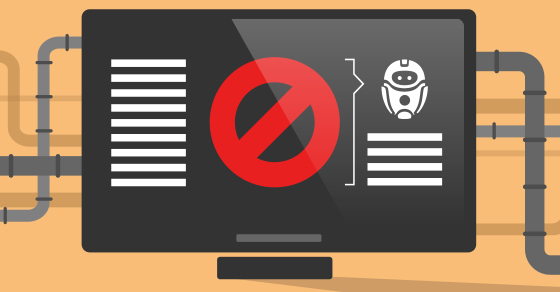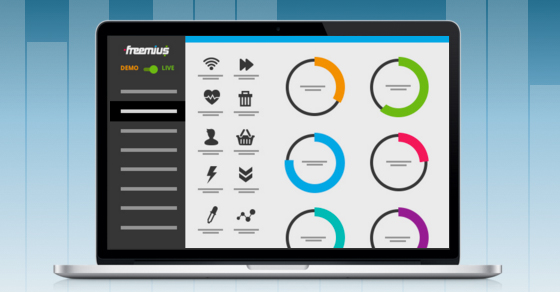|
|
Jose Vega is a young entrepreneur from El Salvador and the lead developer of several successful plugins. His featured plugins are WP Sheet Editor and WP Frontend Admin, which he’s both created in the last 2.5 years and started selling with Freemius.
Jose, thank you for agreeing to do this interview. So, please tell us, where are you from and what’s your professional background?
First of all, thanks for inviting me to this interview.
I’m Jose, I’m 24 years old, and I was born in El Salvador. I created my first WordPress site when I was in high school and started learning programming because I wanted to customize the premium WP theme of my site.

I spent all my time after school studying programming, and I soon got my first client by accident – a small business located around the block from my school. My business basically started when I was 17 years old.
By the time I went to college I was already a beginner-level programmer, and I decided I wanted to make programming my profession.
Unfortunately, I felt that the curriculum of my college was very lacking, so I decided to drop out and complete my education with online resources.
What resources did you use to become a self-taught programmer?
I read a lot of books about WordPress development, professional MySQL, PHP and JS programming (+ other languages). I studied courses about refactoring, how to improve code quality, cybersecurity, how to optimize code to make it scalable, Database architecture and performance, algorithms, design patterns, how to manage servers, and more.
I read the code of WordPress core, WooCommerce and other popular plugins line by line, to understand their design patterns, their approach to security, extensibility, theming, Database architecture, etc.
I read the code of WordPress core, WooCommerce and other popular plugins line by line, to understand their design patterns, their approach to security, extensibility, theming, database architecture, etc.
It also helps to practice the concepts in real-life projects, as there’s no better way to learn something than using it in a lot of projects and spending thousands of hours working on it.
It’s been a big adventure for me. Over the years, I founded a company, worked as a senior developer on hundreds of projects, and I think I’ve worked on more than 60 WordPress plugins and dozens of themes. I’ve worked on sites of all sizes: small sites, startups, and large platforms.
What inspired you to start selling WordPress plugins?
In 2017, I was exhausted. We had finished our biggest enterprise-level platform for a startup, which took about a year of development. The platform was a success, and today it is used by hundreds of thousands of users, including big brands like McDonald’s and Starbucks.
Despite being a good business, it became very clear that we needed to pivot. We were burned out from working on the same project for such a long time – and for someone else – not for our own business.
So we started planning 2 ways to remove our dependency on clients:
- Build our own SaaS platform.
- Start a WordPress products business.
In 2017, I started coding my first WordPress plugin, WP Sheet Editor, during my free time. I was just 22 years old at the time. Soon after, we started planning a SaaS platform with a business partner.
In 2018, we allocated part of the team to focus on client work while the other team members were working full time on our new products.
We had two primary goals for 2018:
- Start working on the SaaS platform (planned for a launch soon).
- I started working solo to grow the WordPress plugins venture, splitting my time between this, the SaaS platform, and managing client projects.
It was a tough year with many personal sacrifices, but we achieved our goals. In February this year, the income from our products grew to the level we wanted and the team started working exclusively on products.
How did you come up with the idea that inspired your first plugin, WP Sheet Editor?
We were talking with a potential client and he needed a way to edit information in the WordPress Dashboard in the simplest way possible. The negotiations fell apart, but I kept thinking about it, and I had the idea of joining the simplicity of a spreadsheet and the WP environment together.
So, this was the first idea I wanted to explore.

Now we have a whole ecosystem of spreadsheets for editing posts, pages, WooCommerce products, user profiles, events, coupons, taxonomies, etc. You can check a demo here to see how it integrates with WordPress.
Our vision is to offer the best way to manage data in WordPress and provide enterprise-level tools for all websites. We focus a lot on performance, high-quality code, and instant customer support. Our customers are always impressed when they update 30,000 products in one second or 100,000 coupons instantaneously, even on cheap servers.
We offer our spreadsheets as standalone plugins (instead of add-ons with a core plugin), which provides many benefits for us:
- It reduces distractions and decisions during checkout. If they need to edit products they buy the one spreadsheet they need. Simple.
- No need to worry about features or add-ons – customers know they get all the tools they need.
- All the features are standardized across plugins: less support needed, shorter learning curve.
- It encourages the purchase of bundles and sometimes generates multiple transactions per customer.
- It helps with content marketing.
How did you come up with the idea that inspired your second plugin, WP Frontend Admin?
When we used to work on projects for clients, we had to create frontend dashboards, account panels, and CRUD pages. It was very repetitive having to create tables of posts with the option to create, edit, and delete posts. Same for users: sign up forms, update user profile forms, etc.
I wanted a way to automate that process, reuse what’s available in the WordPress Admin Dashboard, and make it work with all the plugins.
The result is the WP Frontend Admin plugin, which allows you to display any WP-Admin page in the frontend with one click. It automatically changes the styles of the page to look like your theme, and you can remove unnecessary elements with one click. Users can actually use those pages as part of your dashboard or app.

The plugin made the task so simple that our customers are using it for unexpected things. I’ve seen government websites using it for custom workflows, some users created poll/survey builders, form builder apps, newsletter apps, and more based on third-party plugins.
You’ve told us about a special use case for your plugin regarding WordPress product demos. Do you want to share more about the solution? It’s pretty useful 🙂
Yes. WP Frontend Admin can be used to show a demo of a WordPress product. You can show the settings page on the front-end so the visitors can play with the plugin settings and see the live result on the same page.
Although product demos are not good for every product, they can be useful if you have a visual element of some kind that is one of the core features of your product.
For example, the demo site of our spreadsheet works very well because users can edit and use the tools, so they have no doubts about the plugin’s capabilities when buying it.
What brought you to start selling on Freemius? Did you try any other selling solutions first?
We started selling on CodeCanyon for the first 6 months. It was a big disappointment for a few reasons:
- The sales were really low.
- The plugin was buried under all the hundreds of new plugins that were released after mine.
- The plugin was undervalued.
I knew it wasn’t working after the first week, but I continued on CodeCanyon as an experiment. I tried with high prices, low prices, different titles, etc. and I realized that no matter the price, they always get a bigger piece of the pie. We only received ~33% of the revenue as they have a lot of fees which are hard to understand.
Subscribe and grab a free copy of our WordPress Plugin Business Book
Exactly how to create a prosperous WordPress plugin business in the subscription economy.

At the end of the day, I realized that all the sales came from our own efforts (free version of the plugin and marketing campaigns). So we were giving money away to CodeCanyon.
At the end of the day, I realized that all the sales came from our own efforts (free version of the plugin and marketing campaigns). So we were giving money away to CodeCanyon.
Thankfully I found this review about Freemius on the Delicious Brains blog and I made the switch.
I encourage every plugin and theme shop to check out Freemius. Our plugin income tripled after the first month of using Freemius.
What are your favorite Freemius features that have helped your plugin business the most?
Freemius offers so many great features that I don’t know where to begin. Here are the top few:
- Cart abandonment recovery emails.
- The WordPress SDK only takes me 10 minutes to integrate when I create new plugins.
- The Affiliate Platform is very easy to use.
- The User Dashboard has reduced my support load considerably.
One thing I never expected was the amazing support from the Freemius community, and I’ve learned so much from them. When you start selling on Freemius you get invited to be part of their exclusive DEV Slack channel, where hundreds of plugin and theme sellers chat about growing their product businesses.
What is your advice to other product sellers based on your experience starting a plugin business?
There’s so much to say…I’ll share the top 3.
Prioritize everything based on ROI
There’s no shortage of things that you can work on. You will always want to add more features to a plugin, create more plugins, or do more marketing. But you need to figure out a way to do more with less.
How do we prioritize?
In terms of product development, we work on the tasks that will generate more sales or prevent refunds, and we postpone everything else.
For example:
- Will someone buy the plugin because you rename a spreadsheet column? No. Will someone ask for a refund if we don’t have that option? Probably not.
- Will someone buy the plugin because the spreadsheet options allow you to search by text length? Yes, someone might need to find posts with short content or long titles and edit them quickly, and this capability combined with all the available columns across all data sources generates hundreds of possibilities (that’s why we built it). So, because this is a priority feature for us, we try to make sure they find those use cases on Google and buy the plugin.
In my opinion, everything should be done with marketing and the customer journey in mind, and development should be focused on solving user problems.
When you start developing a product, you have to ask yourself:
- Is someone working on a site now, doing tedious work, and this feature could automate that work?
- Is this feature worth promoting on its own?
- Do we have competition for this feature or new option?
- Is there a free plugin already offering this feature?
- Will someone buy our plugin because we have this feature?
- Is there competition on Google for the related keywords?
If you prioritize development like this, you can reduce development time drastically and possibly even triple your revenue like we did. We try to split releases like this: 60% of tasks that will generate more sales, 20% of improvements that will prevent refunds, and 20% of nice UI improvements.
I recommend checking your changelog and estimating the impact on revenue of every item (new sales, avoided refunds and trial cancellations). If you don’t like what you see, you should figure out what tiny feature you can add to your plugin that will make 10 new people buy it – something small that will make your plugin useful for a new audience.
In terms of marketing, we prioritize tasks that can generate recurring revenue in the long run.
“If I start this campaign, will it generate sales beyond 6 months from now?”. That’s one of the big reasons why we don’t do giveaways or participate much in Facebook Groups – they’re hyped “one-time” kind of strategies.
“If this campaign works, can we do it 1000 more times? Can I teach someone else how to do it?”
The team only works on tasks/projects that will generate recurring revenue. We could ask our developers to work on a project for an old client and make a profit, but if one developer can add 5 easy features to a plugin and those features will generate 10 new sales per month for 4 years, that’s a far better return on investment.
This applies to the customization services that we offer to all of our users. If they want to hire us to add a new feature to the plugin or integrate with other plugins or their themes, we only accept customizations that will be needed by more users or we can add it to the official plugin and it will generate additional sales.
Grow with less effort using SEO
I’ve come to the conclusion that being found is the most important thing. From a developer perspective, who sells more with less effort? One plugin that appears in 100 different searches on Google or 100 plugins that appear in 1 search each in Google?
Last year, when I was working solo on plugins, I created a lot of extensions of the sheet editor plugin. The strategy worked great, but it was a brute force strategy. We could’ve grown at the same rate using SEO.
This January, we hired a full-time writer to join the team to publish content for attracting new users.
We saw an increase in sales and that was just the beginning – the blog will become more effective over time. This strategy took less effort than releasing a new plugin, and the work was considerably easier to scale. It reduced the customer support load a lot as well.

We still have a long way to go in terms of SEO, but I’m very optimistic. We’re getting advice from Green Jay Media, an SEO company founded by a friend of mine.
You need to manage risk and increase stability
All plugin businesses have risks and threats that are out of your control when it comes to marketing:
- Competitors on Google SERPs and WordPress.org
- Changes to the search algorithm on the WordPress.org repository
- Security/reputation of your accounts, like your profile on WordPress.org
- Bad reviews on WordPress.org (anyone can publish bad reviews to hurt you)
- Many more
To mitigate those risks, I’d recommend building a great website that fully represents your brand and products. We need to remove as many “middlemen” as possible between our customers and our products.
The goal is that people who need your products should find you through your website and purchase directly.
What are your future plans for WP Sheet Editor and WP Frontend Admin? Do you have any other cool products on the horizon?
We need to grow in all areas and we’re working hard on that. I’m aware that it will take a while and we might achieve only a few of those goals. But we’d be leaving money on the table if we didn’t consider them:
- Create/extend our ecosystem of extensions.
- Use the affiliate platform from Freemius and find affiliates to help us promote the plugins.
- Grow our 3 blogs (WP Sheet Editor, WP Frontend Admin, and WP Super Admins).
- Collaborate with other plugin sellers on cross-promotions.
- Release more plugins and features for new audiences.
If anyone wants to get in touch to join our affiliate program, discuss partnerships, cross-promotions, or other mutually beneficial strategies, send me an email to josevega [at] wpsuperadmins.com.
Thanks again for letting me share my story!








Thanks for sharing such a inspirational story of Jose Vega. it truly shows that only way to achieve success is through dedication and hard work. silent force behind success of his WordPress plugins in freemius. Glad to know that he has achieved success at such a young age. Good luck to him for his Saas product.